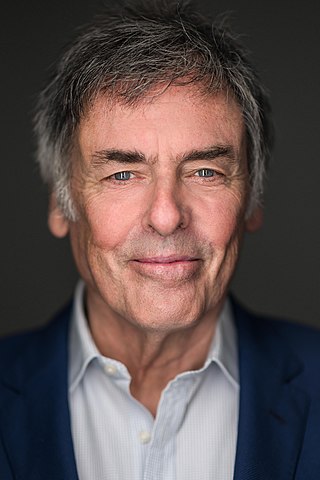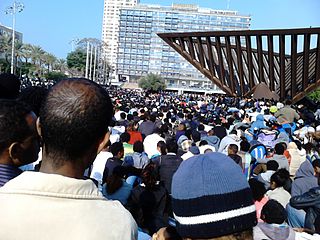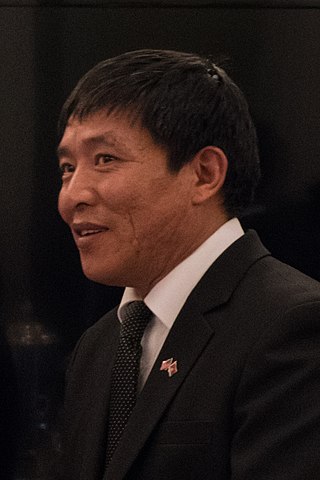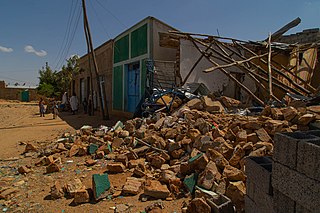Related Research Articles

Isaias Afwerki is an Eritrean politician and partisan who has been the president of Eritrea since shortly after he led the Eritrean People's Liberation Front (EPLF) to victory on 24 May 1991, ending the 30-year-old war for independence from Ethiopia. In addition to being president, Isaias has been the chairman of Eritrea's sole legal political party, the People's Front for Democracy and Justice (PFDJ). As Eritrea has never had a functioning constitution, no elections, no legislature and no published budget, Isaias has been the sole power in the country, controlling its judiciary and military. Hence, scholars and historians have long considered him to be a dictator, described his regime as totalitarian, by way of forced conscription; the United Nations and Amnesty International cited him for human rights violations. In 2022, Reporters Without Borders ranked Eritrea, under the government of Isaias, last out of 180 countries in its Press Freedom Index. In 2023 Eritrea ranked 174th out of 180 countries on the Press Freedom Index.
The human rights record of North Korea has been condemned, with the United Nations and groups such as Human Rights Watch all critical of it. Amnesty International considers North Korea to have no contemporary parallel with respect to violations of liberty.

The situation of human rights in Laos has often been, and remains, a recognized cause for serious concern. Laos is one of a handful of Marxist-Leninist governments and is ruled by a one-party communist government backed by the Lao People's Army in alliance with the Vietnam People's Army and the Socialist Republic of Vietnam in Hanoi.

Human rights in Eritrea are viewed, as of the 2020s, by non-governmental organisations (NGOs) such as Human Rights Watch as among the worst in the world, particularly with regards to freedom of the press. Eritrea is a one-party state in which national legislative elections have been repeatedly postponed, the judiciary is weak, and constitutional provisions protecting individual freedom have yet to be fully implemented. Some Western countries, particularly the United States, accuse the government of Eritrea of arbitrary arrest and detentions and of detaining an unknown number of people without charge for their political activism. Additionally, Eritrean citizens, both men and women, are forcibly conscripted into the military with an indefinite length of service and used as forced labour.

The situation for human rights in Syria is considered one of the worst in the world and has been globally condemned by international organizations like the United Nations, Human rights Watch, Amnesty International, and the European Union. Civil liberties, political rights, freedom of speech and assembly are virtually non-existent under the Ba'athist government of Bashar al-Assad; which is regarded as "one of the world's most repressive regimes". The 50th edition of Freedom in the World, the annual report published by Freedom House since 1973, designates Syria as "Worst of the Worst" among the "Not Free" countries. The report lists Syria as one of the two countries to get the lowest possible score (1/100).
Children of the Secret State is a documentary film about homeless North Korean orphans, released in 2000. It was shot by a UK film duo in conjunction with underground North Korean cameramen.

Eritrea, officially the State of Eritrea is a country in the Horn of Africa region of Eastern Africa, with its capital and largest city at Asmara. It is bordered by Ethiopia in the south, Sudan in the west, and Djibouti in the southeast. The northeastern and eastern parts of Eritrea have an extensive coastline along the Red Sea. The nation has a total area of approximately 117,600 km2 (45,406 sq mi), and includes the Dahlak Archipelago and several of the Hanish Islands.

Michael Kirk is a documentary filmmaker and partial creator of the PBS show Frontline, where he worked as senior producer until 1987. Kirk founded and currently owns the production company, the Kirk Documentary Group, in Brookline, Massachusetts, which has produced dozens of award-winning documentaries, both for Frontline and through his company, that focus on political, social and cultural issues.

African immigration to Israel is the international movement to Israel from Africa of people that are not natives or do not possess Israeli citizenship in order to settle or reside there. This phenomenon began in the second half of the 2000s, when a large number of people from Africa entered Israel, mainly through the then-lightly fenced border between Israel and Egypt in the Sinai Peninsula. According to the data of the Israeli Interior Ministry, 26,635 people arrived illegally in this way by July 2010, and over 55,000 by January 2012. In an attempt to curb the influx, Israel constructed the Egypt–Israel barrier. Since its completion in December 2013, the barrier has almost completely stopped the immigration of Africans into Israel across the Sinai border.
In 2010 the U.S. Department of State reported that:
Eritrea is a source country for men, women, and children subjected to trafficking in persons, specifically conditions of forced labor and, to a lesser extent, forced prostitution. During the reporting period, acts of forced labor occurred in Eritrea, particularly in connection with the implementation of the country's national service program. Under the parameters set forth in Proclamation of National Service, men aged 18 to 54 and women aged 18 to 47 are required to provide 18 months of military and non-military public works and services in any location or capacity chosen by the government....
Eritrean children work in various economic sectors, including domestic service, street vending, small-scale factories, and agriculture; child laborers frequently suffer abuse from their employers and some may be subjected to conditions of forced labor. Some children in prostitution are likely exploited through third party involvement....
Each year, large numbers of Eritrean workers migrate in search of work, particularly to the Gulf States and Egypt, where some become victims of forced labor, primarily in domestic servitude. Smaller numbers are subjected to forced prostitution. In 2009, for example, five Eritrean trafficking victims were identified in the United Kingdom and one in Israel. In addition, thousands of Eritreans flee the country illegally, mostly to Sudan, Ethiopia, and Kenya, where their illegal status makes them vulnerable to situations of human trafficking.

Dhondup Wangchen is a Tibetan filmmaker imprisoned by the Chinese government in 2008 on charges related to his documentary Leaving Fear Behind. Made with senior Tibetan monk Jigme Gyatso, the documentary consists of interviews with ordinary Tibetan people discussing the 14th Dalai Lama, the Chinese government, the 2008 Beijing Olympics, and Han Chinese migrants to the region. After smuggling the tapes of the interviews out of Tibet, however, Dhondup Wangchen and Jigme Gyatso were detained during the 2008 Tibetan unrest.
Eiraeiro is a secret prison in Eritrea. Most sources give the location of Eiraeiro as being situated near the village of Gahtelay, in the Northern Red Sea Region. However, in an article in the Guardian, Eiraeiro is cited as being located approximately 10 miles from the capital, Asmara.

Sound of Torture is a 2013 documentary film written and directed by Israeli filmmaker Keren Shayo which follows Eritrean radio host and human rights activist Meron Estefanos as she reports on Eritrean refugees who have been captured in Sudan while migrating across the Sinai Peninsula into Israel.

Behrouz Boochani is a Kurdish-Iranian journalist, human rights defender, writer and film producer living in New Zealand. He was held in the Australian-run Manus Island detention centre in Papua New Guinea from 2013 until its closure in 2017. He remained on the island before being moved to Port Moresby along with the other detainees around September 2019. On 14 November 2019 he arrived in Christchurch on a one-month visa, to speak at a special event organised by WORD Christchurch on 29 November, as well as other speaking events. In December 2019, his one month visa to New Zealand expired and he remained on an expired visa until being granted refugee status in July 2020, at which time he became a Senior Adjunct Research Fellow at the University of Canterbury.

The Tigray War was an armed conflict that lasted from 3 November 2020 to 3 November 2022. The war was primarily fought in the Tigray Region of Ethiopia between forces allied to the Ethiopian federal government and Eritrea on one side, and the Tigray People's Liberation Front (TPLF) on the other.
The Hitsats massacre was a massacre at Hitsats refugee camp on or around 19 November 2020 during the Tigray War. The civilians killed were 300 Eritrean refugees, according to Europe External Programme with Africa (EEPA), and five humanitarian workers, according to The New York Times, Associated Press, and the United Nations Office for the Coordination of Humanitarian Affairs.

Casualties of the Tigray War refers to the civilian and military deaths and injuries in the Tigray War that started in November 2020, in which rape and other sexual violence are also widespread. Precise casualty figures are uncertain. According to researchers at Ghent University in Belgium, as many as 600,000 people had died as a result of war-related violence and famine by late 2022. The scale of the death and destruction led The New York Times to describe it in November 2022 as "one of the world’s bloodiest contemporary conflicts."

All sides of the Tigray War have been repeatedly accused of committing war crimes since it began in November 2020. In particular, the Ethiopian federal government, the State of Eritrea, the Tigray People's Liberation Front (TPLF) and Amhara regional forces have been the subject of numerous reports of both war crimes and crimes against humanity.

Meron Estefanos is a Swedish-Eritrean human rights activist and journalist. She first became known in the Eritrean refugee community in 2011 for helping people who had been kidnapped and tortured by human traffickers on their way to Israel in order to extort ransom money from their relatives, exemplified in the 2013 documentary film Sound of Torture. After the migrant and trafficking routes changed to Libya, her efforts continued and uncovered criminal networks reaching into Europe. As of 2022, Estefanos deplored that no traffickers had been brought to justice, with little interest from national governments and international organisations.
References
- ↑ Singh, Anita (16 June 2021). "Undercover in Africa's Secret State: Dispatches, review: this report on Eritrea was truly brave journalism". The Telegraph. Retrieved 2 October 2021.
- ↑ Taddonio, Patrice (4 May 2021). "'I Didn't Lose Hope': Meet a Man Who Risked His Life to Secretly Film Inside One of Eritrea's Brutal Prisons". FRONTLINE. Retrieved 2 October 2021.
- ↑ "Escaping Eritrea: FRONTLINE". 4 May 2021. Retrieved 2 October 2021.
- ↑ Petros, Michael (2 June 2021). "Reflections on the documentary 'Escaping Eritrea'". One Day Seyoum. Retrieved 2 October 2021.
- ↑ Boghani, Priyanka (4 May 2021). "'Escaping Eritrea' Filmmaker Evan Williams Describes 'Phenomenal Sacrifice' of Eritreans Sneaking Footage Out of Country". FRONTLINE. Retrieved 2 October 2021.
- ↑ "Escaping Eritrea". FRONTLINE. Retrieved 2 October 2021.
- ↑ "Escaping Eritrea". pbsinternational.org. Retrieved 2 October 2021.